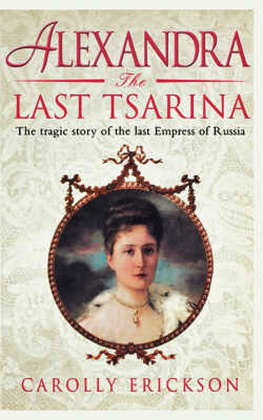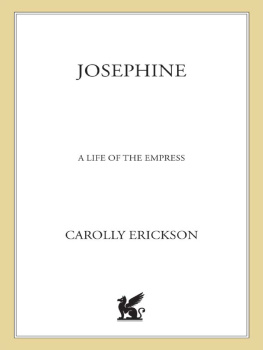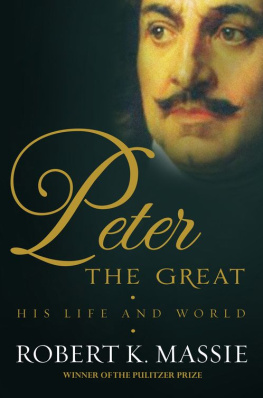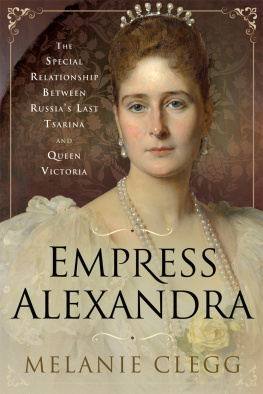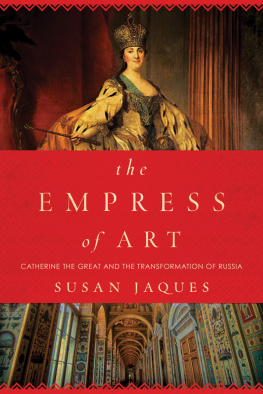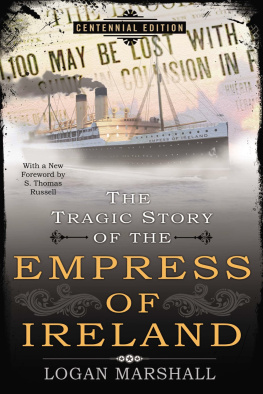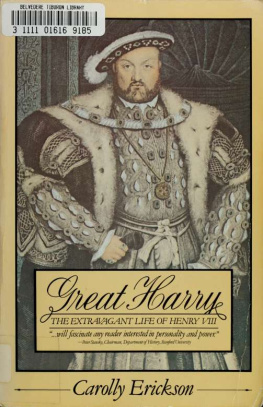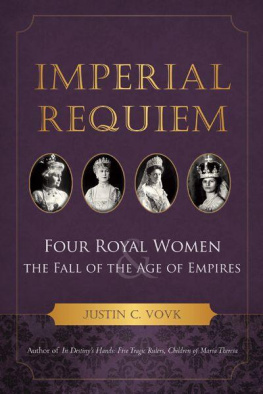Carolly Erickson - Alexandra: The Last Tsarina
Here you can read online Carolly Erickson - Alexandra: The Last Tsarina full text of the book (entire story) in english for free. Download pdf and epub, get meaning, cover and reviews about this ebook. year: 2003, publisher: Robinson Publishing, genre: Non-fiction / History. Description of the work, (preface) as well as reviews are available. Best literature library LitArk.com created for fans of good reading and offers a wide selection of genres:
Romance novel
Science fiction
Adventure
Detective
Science
History
Home and family
Prose
Art
Politics
Computer
Non-fiction
Religion
Business
Children
Humor
Choose a favorite category and find really read worthwhile books. Enjoy immersion in the world of imagination, feel the emotions of the characters or learn something new for yourself, make an fascinating discovery.
- Book:Alexandra: The Last Tsarina
- Author:
- Publisher:Robinson Publishing
- Genre:
- Year:2003
- Rating:5 / 5
- Favourites:Add to favourites
- Your mark:
- 100
- 1
- 2
- 3
- 4
- 5
Alexandra: The Last Tsarina: summary, description and annotation
We offer to read an annotation, description, summary or preface (depends on what the author of the book "Alexandra: The Last Tsarina" wrote himself). If you haven't found the necessary information about the book — write in the comments, we will try to find it.
Alexandra: The Last Tsarina — read online for free the complete book (whole text) full work
Below is the text of the book, divided by pages. System saving the place of the last page read, allows you to conveniently read the book "Alexandra: The Last Tsarina" online for free, without having to search again every time where you left off. Put a bookmark, and you can go to the page where you finished reading at any time.
Font size:
Interval:
Bookmark:
Carolly Erickson has a PhD in medieval history from Columbia University, New York, which led to six years as a college professor, then to a career as a full-time writer. Her many books include biographies of Empress Josephine, Catherine the Great, Bloody Mary and Elizabeth I.
Praise for Alexandra: The Last Tsarina
This biography... is by one of the most accomplished of biographers... [It] takes one through her life at a good pace and makes use not only of the established sources but of the wealth of new information made available by the collapse of the Soviet Empire.
Contemporary Review
Using material previously unavailable, the author presents a closely observed and enthralling biography.
Ilysa Magnus, Historical Novels Review

Constable & Robinson Ltd
3 The Lanchesters
162 Fulham Palace Road
London W6 9ER
www.constablerobinson.com
First published in the US in hardback
by St Martins Press, 2001
This paperback edition is published by Robinson,
an imprint of Constable & Robinson Ltd, 2003
Copyright Carolly Erickson 2001
The right of Carolly Erickson to be identified as the author of this work has been asserted by her in accordance with the Copyright, Designs and Patents Act, 1988
All rights reserved. This book is sold subject to the condition that it shall not, by way of trade or otherwise, be lent, re-sold, hired out or otherwise circulated in any form of binding or cover other than that in which it is published and without a similar condition including this condition being imposed on the subsequent purchaser.
A copy of the British Library Cataloguing in
Publication Data is available from the British Library
ISBN 1-84119-782-3 (pbk)
ISBN 1-84119-464-6 (hbk)
eISBN 978-1-47210-797-8
Printed and bound in the EU
10 9 8 7 6 5 4 3 2 1
We are born in a clear field and die in a dark forest
Russian Proverb

I n the darkened bedroom of the new palace in Darmstadt, Alice, Grand Duchess of Hesse, lay dying. She was only thirty-five, but looked fifty, her white face with its sharp features gaunt, her eyes deeply sunken in their sockets, her heaving chest narrow and bony.
For the past month Alice had exhausted herself nursing her family through an epidemic of diphtheria, sitting beside their beds through the long nights, holding their hands, coming when they called out to her. The weakest and youngest of the children, her four-year-old daughter May, had been the most severely ill, and when she died, the pain Alice felt, she wrote to her mother Queen Victoria, was beyond words.
Her other stricken children fifteen-year-old Victoria, twelveyear- old Irene, ten-year-old Ernie and six-year-old Alicky had all survived, though Ernie had for a time been given up for dead; her husband Louis, robust and thickset, had lain in bed for several weeks in a semiconscious state, unable to eat and barely able to speak, until gradually, under her unceasing care, he began to recover his strength.
Though most of her family and many of her servants succumbed, Alice herself had at first seemed immune to the terrible disease, as if willing her body to resist it so that she could spend herself in nursing the others. But after several weeks of overwork, lost sleep and anxiety she too experienced the painful sore throat, fever and throat-tightening constriction that were the hallmarks of diphtheria, and she took to her bed, unable to do anymore for her ravaged family.
They stood by her bedside now as she struggled for breath, clutching the bedclothes and straining to fill her congested lungs. She had had a severe attack, and Louis had felt it necessary to notify the state officials and to request prayers in all the churches of the small German principality of Hesse. A telegram had been sent to Queen Victoria at Windsor telling her that Alices condition was worsening. And the children had been summoned to stand by their mothers bed, and to say their prayers for her.
The youngest of the children, sweet-faced, golden-haired Alicky, stood next to her brother Ernie, her mainstay and closest companion, watching the events in the silent room. Her expressive grey-blue eyes were troubled, for all was loss and confusion in her world her little sister dead and in her small coffin, her mother near death and beyond her reach, her governess Orchie, always so self-possessed and calm, upset and in tears. Even the nursery itself, spare and homely, was particularly sad and bare, for all the toys had been taken away to prevent their carrying infection.
Several crosses hung from the walls in the sickroom, together with verses from the Bible. There were pictures of Balmoral and of Windsor Castle and its grounds and portraits of Alices sisters and brothers, and several tapestries in the fashionable William Morris style. Dominating the room was a stained glass window, dedicated to the memory of Alickys brother Frederick, or Frittie, who at the age of three had fallen from that very window to his death on the terrace below. Alicky was too young to remember Frittie, she had been an infant when he fell, but she knew that her mother grieved for him and she and the other children went every year to visit his grave. On Fritties memorial window were the comforting words from the Bible, Suffer the little children to come unto me. Alicky, lonely and fearful, had much need of comfort, for as the hours passed her mother grew weaker, her every breath an effort.
Throughout Hesse prayers were being offered up for Alice, the Landesmtter (Mother of the Country), who had earned the respect of her husbands subjects by nursing the sick, visiting the poor and founding hospitals and schools. Since her marriage to Grand Duke Louis, Alice had thrown herself into the cause of social betterment, never satisfied with what she had done and always striving to do, as she said, the little good that is in my power.
Alice had created a stir in quiet Darmstadt, introducing the Art Nouveau style in the grand ducal palace, playing duets with Johannes Brahms (Darmstadters preferred Mozart), substituting informality for formal etiquette at court, even holding daring religious views that aimed, as she said, to separate the historical Jesus from such later embellishments as the resurrection. Though her outraged mother-in-law called Alice a complete atheist, and the quiet Darmstadters clucked their tongues over her outspokenness (Providence, there is no Providence, no nothing! Alice burst out when her favourite brother Bertie was gravely ill, and I cant think how anyone can talk such rubbish,) Alice maintained her opinions truculently, and dared others to refute them.
A new and more liberal spirit had come to Hesse with Alice, but in her effort to make changes and to air her advanced views she had brought disruption and controversy, and even as she lay on her deathbed there were whispers respectful, quiet whispers that her demise would restore a welcome peace to the community.
For Alices rigorous commitment to modernity was rooted in a mental and spiritual restlessness that made others uneasy. There was something hard and flinty at her core, an icy toughness of mind, that was seemingly at odds with her overall charitableness. She was unforgiving. Demanding a great deal of herself, she demanded as much of those around her, and constantly found them wanting especially her warm-hearted, stolid husband Louis, who disappointed her at every turn.
Next pageFont size:
Interval:
Bookmark:
Similar books «Alexandra: The Last Tsarina»
Look at similar books to Alexandra: The Last Tsarina. We have selected literature similar in name and meaning in the hope of providing readers with more options to find new, interesting, not yet read works.
Discussion, reviews of the book Alexandra: The Last Tsarina and just readers' own opinions. Leave your comments, write what you think about the work, its meaning or the main characters. Specify what exactly you liked and what you didn't like, and why you think so.

